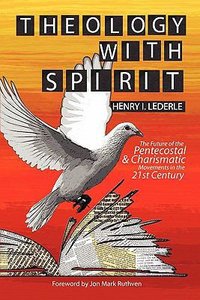Henry I. Lederle: The Third Wave: New Independent Charismatic Churches, Part 1

Editor’s Note: In this excerpt from his latest book, Professor Lederle says the “third wave” should perhaps be called the rise of the new independent charismatic churches. The Pneuma Review editorial committee hopes you will be encouraged as you read this chapter and will purchase this excellent book for yourself.
The third major movement of the Pentecostal-Charismatic segment of Protestantism distinguishes itself from the First and Second Waves in two important ways. First, as we have just seen, it led to new structures being formed. Although the word “denomination” has remained suspect in these circles, and the idea of tradition is usually also viewed rather negatively, these new Christian groups are, in fact, already new denominations in the making, rapidly forming their own traditional patterns of organization and church life. It has been estimated that over 3,000 of these new independent Charismatic groups or denominations have been established globally. Second, in the teaching of these Independent Charismatic Churches, a whole spectrum of innovative doctrinal emphases emerged. There has been much debate about some of these teachings. Usually there is some continuity to be found within the Pentecostal-Charismatic heritage with these new teachings. Some of their teachings have remained contentious, especially in the wider circles of Christianity. The fact is, however, that most of these innovations had their roots in the classic spiritual writers of the nineteenth century. This fact will be pursued later.
The term “Third Wave” will now be used as synonymous with the Independent Charismatic Churches. Here the primary slogans and metaphors were not “Hang in there,” “Be salt and light,” “Renew from within,” as in the Second Wave, but rather, “Go out from among them,” avoid “unequal yoking,” seek “new wineskins” for the new wine. The universally pervasive conviction was that “the Cloud has moved on” and God’s pilgrim people need to launch out and chart a new course. The people who make up this new move include both converts to the Christian faith and many believers who transferred from other churches. A significant number of the latter group came from both the First and the Second Waves. Classical Pentecostalism provided a large number of leaders in the Independent Charismatic movement.
Some believed that the Pentecostals had themselves fallen prey to denominationalism and had become too formal or traditional. The Latter Rain movement expressed this in a scathing critique of Pentecostal churches that led to an equally swift denouncing of the Latter Rain as a heretical movement. Although the Classical Pentecostal denominations continued to experience growth, some of their members left to join the new Independent Charismatic ministries. The same applied to the Second Wave. It has been estimated that at least 50% of mainline denominational Charismatics gave up on their program to renew their churches from within and left for what they considered to be greener pastures. They had a hunger for a church where Spirit-empowerment and Charismatic gifts and ministry could be more visible or regular. Some naturally found a home in major Pentecostal denominations, such as the Assemblies of God. A larger section of the discontented, however, pursued the pathway of the non-denominational or Independent Charismatic Churches.
First a word needs to be said about the term “Third Wave.” It was, I believe, first coined by C. Peter Wagner, at that time from the School of World Missions at Fuller Theological Seminary in Pasadena, California. He believed that the “Second Wave,” or denominational Charismatic movement, influenced the larger mainline Protestant churches that were of a more liberal background theologically. I disagree with this analysis and maintain that more conservative and evangelical Protestants were also deeply involved in this movement from the very beginning. Wagner further stated that the Second Wave writers, who preferred to identify themselves as Charismatics rather than as being of a Neo-Pentecostal persuasion, nevertheless still remained within the theological tradition of a theology of subsequence with a heavy emphasis on glossolalia. The more integrative understandings of Spirit-baptism, as developed in the global Charismatic awakening, especially in England and Germany, were less prominent in the United States than in Europe, and their unique contribution may have escaped his notice. As a result, the awakening of charismatic gifts—especially of healing and prophecy—among more conservative Protestant groups was heralded by Wagner as constituting a “Third Wave,” while others, like myself, still considered them as an integral part of the whole denominational Charismatic Renewal, or Second Wave.
Category: Church History, Pneuma Review, Winter 2012


